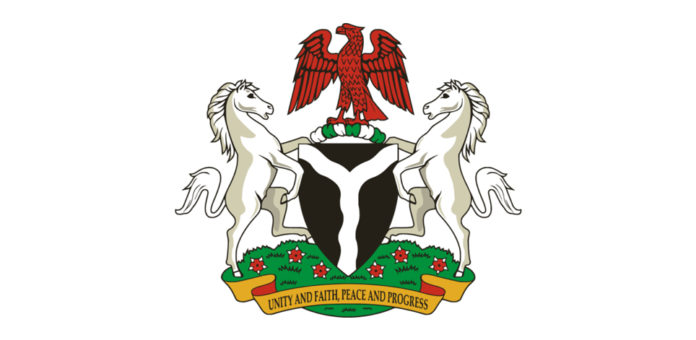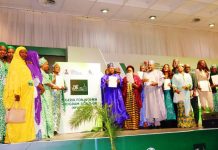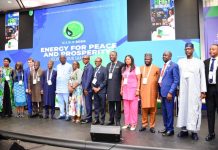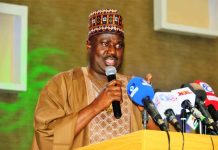Guest Lecture by H.E. Yusuf Maitama Tuggar, OON
Honourable Minister of Foreign Affairs, at the Nigerian Institute of International Affairs (NIIA), Lagos on Friday, 12 September, 2025.
It is a privilege to address this audience at the NIIA; our nation’s foremost think tank on foreign policy and international strategy. Since its establishment some 64 years ago, the NIIA has served as the intellectual compass of Nigeria’s external engagements, providing clarity of vision and policy direction in moments of global flux.
I am grateful to the Institute for hosting this engagement. The Institute’s role is not ornamental—it is foundational. Its research, policy analysis, and convening power have shaped how Nigeria positions itself on the world stage. Today, more than ever, the synergy between foreign policy practice and scholarly expertise must be deepened, if Nigeria is to navigate the complexities of the 21st century. As William Wallace once opined, the study of International Relations is not an innocent profession. Unlike mathematics, it is not an abstract training of the mind. IR was created to contribute to better government and bring reasoned debate into politics and policy-making.
Distinguished fellows, ladies and gentlemen, we meet at a time when the international system is undergoing profound transformation. Climate change is redrawing the geography of security. Desertification in the Sahel is fueling conflict and migration. Artificial intelligence is redefining the future of work and even the ethics of warfare, as we see in debates about autonomous weapons. Transnational terrorism, as witnessed in the persistence of Boko Haram and ISWAP, tests the resilience of states. Fear of third-world migrants is polarising politics in the global North, as ecofascists agitate for pulling up the proverbial draw-bridges to save Western civilization, reminiscent of Jean Raspail’s dystopian fiction Camp of the Saints. Widening inequality and changes in distribution of power are bringing about modifications to the global superstructure and a multipolar order. Such liminal moments are precarious and unpredictable. The pressures of major powers in this emerging multipolar world for Nigeria and others to follow the path of band-wagoning and align with them, are enormous.
There was a time in the-not-so distant past when Nigeria faced similar pressures under a bipolar system and was able to navigate its way through, with much help from the intellectual firepower of the NIIA. Recognition of the MPLA, the World Conference for Action Against Apartheid and the Ogaden War come to mind. The era of non-alignment, gave Nigeria the latitude to pursue its Concert of Medium Powers and Concentric Circles strategies at a time when many fell victim to entanglements and ended up being battlegrounds of superpower contestations.
On the economic front, the contestation was between the Lagos Plan of Action and the Berg Report (or, if you will, The Washington Consensus). It was between integrating African markets to produce manufactured/finished goods or being consigned to a Sisyphean eternity of exporting raw materials/agricultural commodities. But Band-wagoning worked on the economic front and Nigeria, like other African countries, would fall prey to SAP. African countries were forced to open up their markets to more industrialized nations and to abandon industrial policies and import substitution. The rest, as they say, is history.
But that was the 20th Century. The 21st century and the new multilateral order bring new opportunities, despite a daunting transition. The Tinubu administration has developed a foreign policy agenda defined by Nigeria’s aspirations in the 21st century- Strategic Autonomy, predicated on the pillars of Democracy, Demography, Development and Diaspora. The idea is to avoid the booby trap of entangling alliances or ideological over-alignment, but rather, to focus on issue-based relationships focusing on shared interests and partnerships of purpose. We seek to preserve our flexibility and autonomy where our national interest is concerned. Binary alignments inhibit nations like Nigeria with size and scale to remake the world. We possess a huge population, which means a larger talent pool, massive internal markets that drive down costs and make us resilient and the ability to even field larger armies to defend ourselves, if need be. We must begin to resist flawed self-diagnosis, which (if care is not taken) becomes a self-fulfilling prophesy.
And please don’t get me wrong; Strategic Autonomy is not the same as being duplicitous or hypocritical. It’s being pragmatic. And as Nigeria has always been, our foreign policy remains guided by moral precepts and ethical considerations. The behaviour of each country is a factor in the calculation of other countries. Africa remains a priority and the prospects of integration to achieve economic development are much higher, now that we have the AfCFTA. Cooperative defence, whether through MNJTF, ECOWAS, or the AU remains a priority.
Quite often, when some hear the mention of Democracy as one of the 4Ds, they accuse us of proselytizing. Far from it. We believe in the variable geometry of democracy, its different forms and speeds of practice. It’s time Africa took ownership of Democracy to suit its own history, cultures, traditions and mores. No one holds a patent on Democracy and its practice. For this reason, we have developed the Regional Partnership for Democracy (RPD) at MFA (in-house) and partnered with the UNDP to finetune and implement it. It is a means of working with other countries- especially in our region- to help strengthen democratic institutions, improve conditions of democratic morality- to even disagree profoundly, but at the same time find ways through discourse to continue the relationship and to somehow learn from your opponent.
Signed:
Kimiebi Imomotimi Ebienfa, anipr
Spokesperson,
Ministry of Foreign Affairs, Abuja.
Sunday 14th, September 2025






